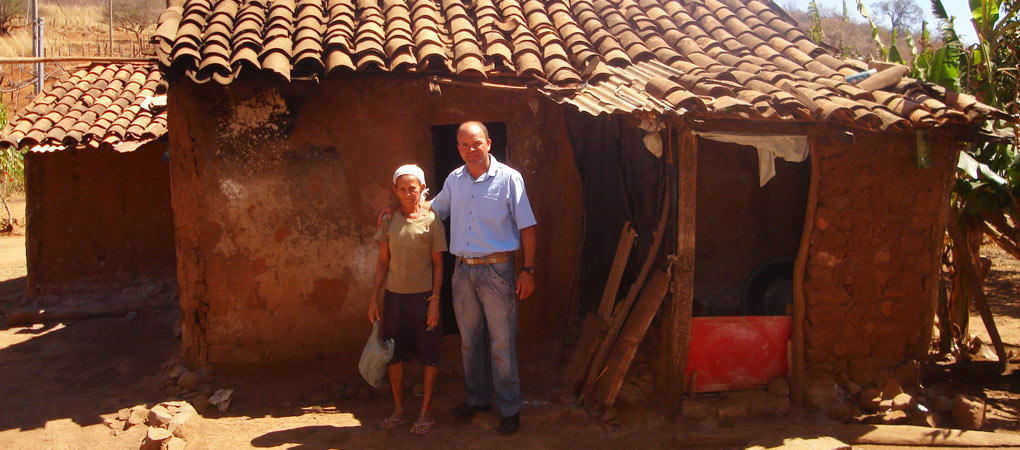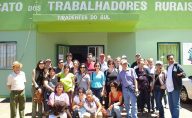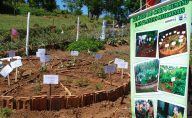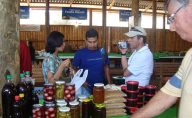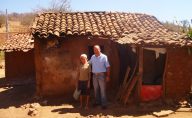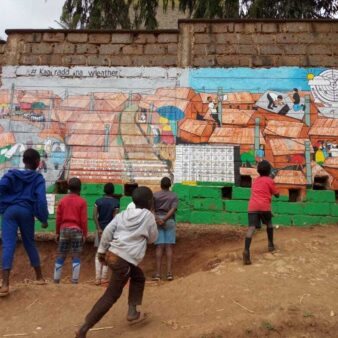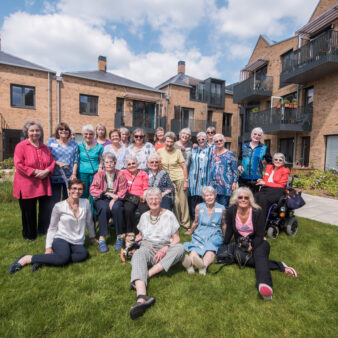The COOPERHAF rural housing cooperative was established in 2001 by the Workers’ Federation of Family-Based Agriculture (FETRAF-SUL/CUT) to address the critical housing needs of very low-income agricultural families in Brazil. A participatory approach is used to mobilise and organise families and help them build, improve or expand their homes. The project is community led and managed and construction work is carried out by the families themselves through self-build with the help of a mason and COOPERHAF’S technical team. Families are assisted in accessing funding from existing government housing programmes, as well as affordable credit. The project also focuses on creating sustainable livelihoods through capacity building, forming cooperatives and diversifying agricultural production thereby increasing income generation opportunities and ensuring food security. Originally established in three states of southern Brazil, the project has expanded to cover 12 of the 26 Brazilian states and has worked with over 30,000 low-income families to date.
Project Description
Aims and Objectives
The main objective of the project is to develop sustainable solutions for small independent and family farmers across the country, through a comprehensive approach to habitat and livelihoods that includes housing as its starting point. Additional aims include building capacity and strengthening organisations of family farmers, increasing awareness and understanding that housing is a right and that rural workers deserve to live with dignity, debating issues regarding the social division of work and the role of women in decision-making processes, generating additional income for small farmers through the establishment of cooperatives and emphasising the importance of production for self-consumption.
Context
The housing shortage in rural areas of Brazil affects more than 1.7 million farmers and rural workers, many of whom live in precarious, high-risk and often overcrowded conditions without access to basic services. Formerly landless rural workers receiving land through the agrarian reform process are particularly vulnerable and often do not have access to safe drinking water or suitable sanitation facilities, resulting in improper waste disposal. The shortage of adequate housing in rural areas has meant that many young couples must choose between living with their parents and migrating to the cities.
Key features
The COOPERHAF rural housing cooperative was established in 2001 by the FETRAF-SUL/CUT workers’ federation, with the purpose of addressing the critical housing needs of low-income rural families in the three southern states of Brazil and obtaining access to funding for the construction, improvement and expansion of their homes. A participatory approach was developed and key stages include mobilisation and organisation of families, ensuring their active participation throughout the process; construction, improvement and expansion of rural housing; and follow-up and post-occupancy research. The project works with small family farmers in the southern states of Brazil as well as former landless workers in different parts of the country who have recently received land through the agrarian reform process.
In addition to housing, the project focuses on creating sustainable livelihoods through capacity building, the formation of cooperatives, diversification of agricultural production to increase opportunities for income generation and ensure food security, and commercialisation. The project also addresses issues of social inclusion: enhancing the role of women, generating opportunities for young people in rural areas and incorporating the wisdom of the older generation in the improvement of living conditions.
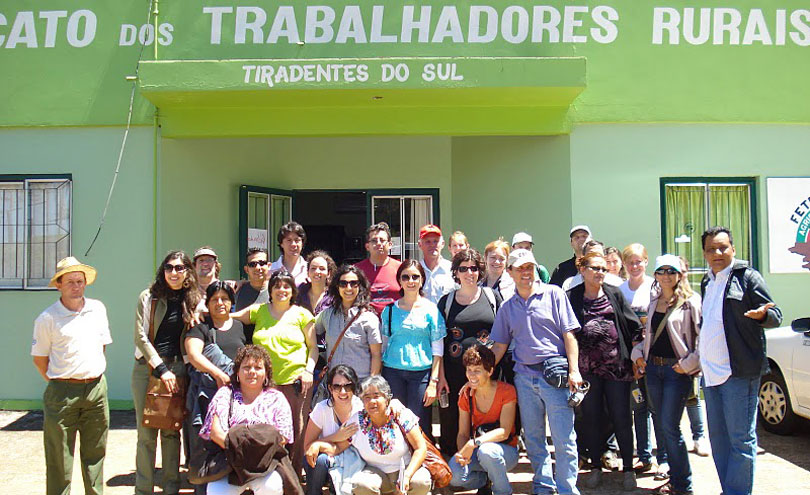
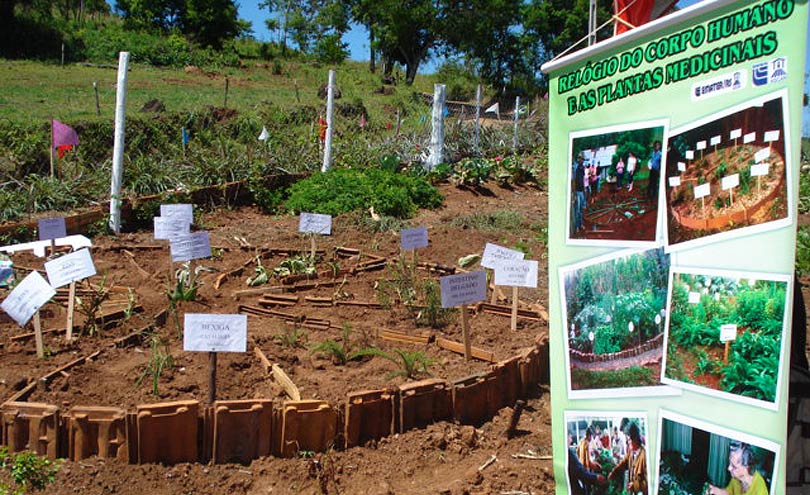
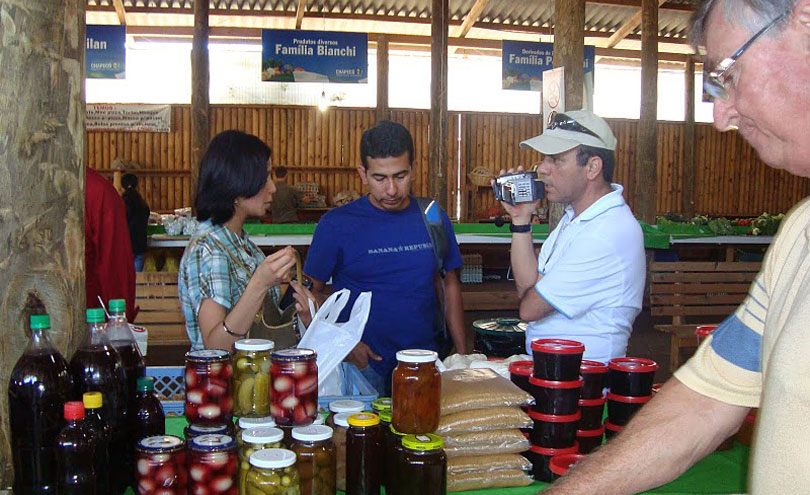
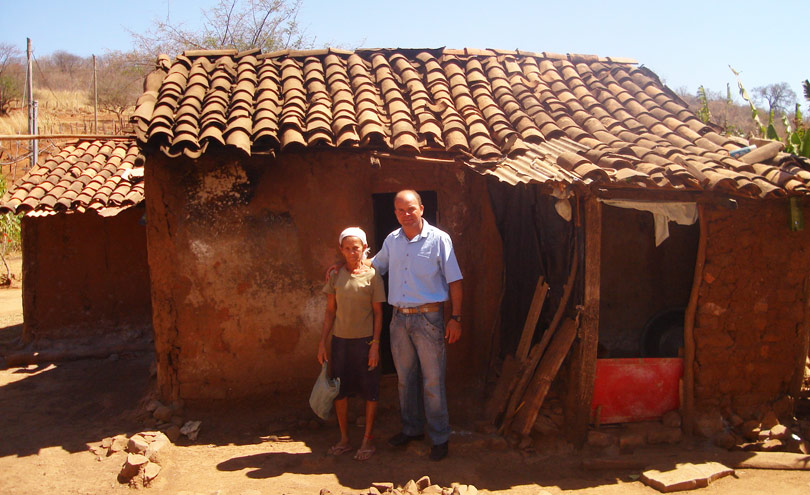
The project is community-led and managed, with a municipal coordinator working with the families in each municipality. Construction work is carried out by the families themselves through self-build with the help of a mason, and technical assistance is provided by COOPERHAF’s multidisciplinary team. Approximately 60 per cent of projects to date have been new construction and 40 per cent refurbishment, varying from region to region according to existing housing conditions.
The various housing types have been designed with the participation of the farmers according to their budgetary and design needs. Residents are involved at various stages of the process, from selecting and adapting housing types and choosing a mason to taking part in the construction of their own homes with technical assistance from COOPERHAF’s team and planning the development of their land. Throughout the process, residents take part in a series of workshops on themes ranging from construction methods to farm diversification.
With an increasing focus on environmental issues, COOPERHAF began in 2007 to train its technical and construction teams in agro-ecology and the use of sustainable building materials and technologies.
The work of COOPERHAF has expanded to cover 12 of the 26 states across the country and has resulted in improved housing conditions and sustainable livelihoods for over 30,000 low-income families to date.
Covering costs
Funding for the project has been obtained from a range of national and state government housing programmes, including the PSH housing subsidy programme, the FGTS Government Severance Indemnity Fund for Employees and FNHIS National Social Interest Housing Fund. Funding provided through the subsidy programmes ranges from US$640 per household for housing improvement and expansion to US$2,560 per household for new housing construction, and requires a counterpart contribution from families that varies between US$640 and US$2,135 depending on the programme and size of the home. The total cost per unit (for new construction) therefore varies between US$3,200 and US$4,696 and covers building materials and labour, as well as technical assistance. Families contribute their labour as well as the counterpart, which can be paid through residents’ own savings, loans from banks such as the Cresol Central bank or grants received from different agencies.
The Ministry of Labour and Employment provided funding for capacity building of COOPERHAF staff, masons, municipal coordinators and a women’s collective. The Ministry of Agrarian Development has provided a total of US$99,525 in funding to cover the costs and materials of the workshops carried out with the small farmers.
Prior to 2006, each associate/household paid a one-off fee of US$45 to become a member of the cooperative and be included in the project. This allowed the cooperative to hire technical and social professionals and covered the costs of printed materials and other expenses. Since 2006, these costs are covered by the current federal government housing programmes and associates must now pay a fee of only US$2 to join.
Impact
- Farm diversification and the formation of agricultural production cooperatives have increased livelihood opportunities, ensured food security and helped to generate income for families.
- The workshops and meetings carried out as part of the programme have given residents the chance to discuss their ideas and struggles with other families who also live from agriculture.
- The project has increased affordability of housing for low-income rural families by providing a way in which families can get support in accessing federal and state housing programmes.
- Improved sanitation has had a positive impact on public health, with a reduction in the contamination of rivers and other water bodies. Post-occupancy studies have shown that the improved housing conditions have led to improved health and increased self-esteem among residents.
- The work of the organisation has influenced housing policy, ensuring the inclusion of rural families in the National Housing Policy of the Ministry of Cities.
Why is it innovative?
- Looking at rural housing from a broad perspective and addressing issues of income generation (diversification, production for self-consumption, formation of cooperatives and commercialisation) and social relations (gender, youth and older persons) throughout the process.
- Both COOPERHAF and FETRAF-SUL/CUT are pioneering organisations in the field, the former for its work in the social organisation of small independent and family farmers and the latter for the social technology and methods that have been developed to support low-income families in rural areas, taking housing as a starting point.
- Working in partnership with community leaders to carry out dialogues and training activities with residents to ensure greater participation and incorporate local knowledge into the process.
- The project is community-led and managed, with technical assistance provided by COOPERHAF’s multidisciplinary team.
- COOPERHAF has developed a digital intranet system which is used in partnership with community leaders to monitor the project’s activities in each of the municipalities that it works in.
What is the environmental impact?
- There is a growing demand for environmentally sustainable housing and agro-ecology, particularly in the southern states, and a special unit has been developed within COOPERHAF, and in partnership with Cresol Central Bank, to carry out research and development of sustainable homes.
- In 2007 COOPERHAF began to train its technical and construction teams in the use of sustainable building materials and technologies, including superadobe, soil-cement bricks, rammed earth and ferro-cement water tanks for use in irrigation. With the support of the Cresol Central bank and the Pampa Institute for Permaculture and Eco-Villages (IPEP), COOPERHAF is currently building its first six eco-homes in the state of Santa Catarina.
- A study carried out with 50 families in Santa Catarina showed that prior to the project, only 42 per cent of families had septic tanks; 18 per cent had black wells and the remaining households used open areas and rivers. The installation of septic tanks in 100 per cent of the homes has had a positive impact on the environment as well as on people’s health.
Is it financially sustainable?
- Policies and programmes to enable access of low-income rural families to housing have been included in a National Housing Policy that has recently been established, helping to ensure the continuity of the process.
- A key aim of the project is to support livelihoods and generate income for small independent and family farmers. Examples include support and training for the formation of agricultural production cooperatives (e.g. milk cooperatives) and agro-ecology collectives as well as marketing and commercialisation of agricultural products. Diversification is encouraged to reduce seasonal income variability.
- A new agreement has been signed with FETRAF, Cresol Central and technical cooperative COOPERTEC for a network of 135 professionals in the areas of agricultural engineering and social sciences in the three southern states to provide technical assistance and follow-up support to families, particularly in the area of livelihoods and income generation, for two to three years following the construction of their homes.
- The project works with very low-income families, 97.8 per cent of which, according to post-occupancy research carried out by COOPERHAF, would not previously have been able to afford to build, improve or extend their homes.The project provides support to families so that th ey can access existing state and federal housing programmes, loans and subsidies. For families who cannot afford to pay the counterpart contribution, ethical lenders such as Cresol Central and some state government agencies are able to provide additional support in the form of low-interest loans or grants.
What is the social impact?
- The project has created spaces for sharing and discussing ideas and experiences, through the workshops, meetings and assemblies carried out as part of the programme. Particularly in the south of the country, there is a tradition of hospitality and solidarity amongst neighbours and the project has both strengthened existing social networks and created new ones.
- The project encourages the formation of associations, cooperatives, agro-ecology collectives and other activities that facilitate community cooperation.
- The social component of the project includes a series of workshops with participating families on construction methods for rural housing, social rights, organisation and cooperativism, social division of work, farm diversification and household organisation (planting of fruit orchards, medicinal plant and vegetable gardens).
- One key component of the social programme specifically addresses issues of social inclusion, e.g. enhancing the role of women in management and decision-making, ensuring children are in school and have time to play, generating opportunities for young people in rural areas and protecting the rights of older people. Through the project, women in particular have been empowered to actively participate in community assemblies and decision-making processes – areas in which previously they did not have a voice.
- Local leaders have been hired as municipal coordinators to organise the training activities and carry out the ongoing management of the project.
Barriers
- At the start of the project, there was no regulation regarding rural housing in the region. COOPERHAF had to start from scratch and developed a project proposal for the state government of Rio Grande do Sul. The proposal was approved and financial support was provided for building materials and labour for the first 357 houses in the programme.
- The next challenge was to transfer the experience to the other southern states of Santa Catarina and Paraná. Based on the positive experience in Rio Grande do Sul, the governments of Santa Catarina and Paraná decided to support the project.
- Another key challenge was to adapt existing national and state housing programmes (which had been planned for urban areas) to the rural context. Through much negotiation and discussion, COOPERHAF was able to ensure that rural families were also included in housing programmes and that the government also considered the demand for rural housing.
- The organisation’s main challenge at present is in transferring the approach to other states across the country, with very different contexts. COOPERHAF has been working to start a relationship with CAIXA and other institutions in the other states who do not have any experience of such housing programmes in their localities; to build capacity among new professionals, municipal coordinators and trade unions, and finally to adapt the housing and social projects to the specific social, economic, cultural and geographical conditions of each state.
Lessons Learned
- Strengthening social networks and organising groups of small independent and family farmers is crucial. A community low in social capital, with weak social networks and little interaction between households, is also less able to negotiate assets.
- Empowering local leaders has proven to be a very successful strategy, as it allows local knowledge to be captured and used and enables regional federations and trade unions to carry out the housing programmes themselves.
- The process of expansion and transfer of the approach must be gradual, as conditions vary from state to state. Special attention must be given to livelihood strategies and appropriate diversification options, as well as making the link between macroeconomic policies and micro-level policy adaptations.
Evaluation
COOPERHAF has developed a digital intranet system to monitor activities in all of the municipalities where work is being carried out. Photographs and reports are sent by COOPERHAF staff and trade union representatives via the system to keep members of staff up to date with the progress of construction work, community assemblies etc. Post-occupancy evaluations are carried out by the COOPERHAF team.
Transfer
- The work of COOPERHAF began in 2001 with one project for 357 families and gradually expanded its work to the three southern states of Brazil, reaching 55 municipalities in the state of Paraná, 120 municipalities in Santa Catarina and 85 municipalities in Rio Grande to Sul.
- In response to a growing demand, COOPERHAF began in 2006 to work in partnership with the FETRAF-BRASIL federation to adapt and transfer the approach to an additional 9 states across the country, thereby working in 12 of Brazil’s 26 states. Affiliate offices have been set up in each state, employing a small team of local professionals as well as local leaders to work as municipal coordinators, provide local knowledge and adapt the approach to each state’s specific circumstances. The project is adapted according to each particular context (e.g. available local materials, existing funding schemes at municipal and state levels, climatic conditions, etc).
- COOPERHAF has recently signed an agreement with the Special Secretariat for Aquiculture and Fishing (SEAP) for the experience to be transferred to 260 fishing families in the three southern states. COOPERHAF will be working in partnership with SEAP to transfer the approach and methods to the SEAP team and work is due to begin in 2009.

